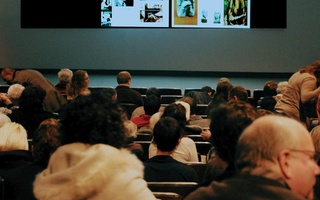While most Harvard College students focus on what they will take away from a course, students who enroll in Sociology 152: “Philanthropy and Public Problem-Solving” this spring will have the opportunity to give back—in the form of $100,000 in grants to Boston-area non-profits of their choice.
Students enrolled in this new course will split into teams based on area of interest. Each team will conduct research on a particular social issue, ranging from homelessness to education reform, and will eventually choose a local organization to provide with a grant.
The Once Upon A Time Foundation, based in Fort Worth, Texas, has donated $100,000 for students enrolled in the course to distribute to non-profits. The foundation has funded similar courses at Stanford, Princeton, Yale, and various colleges in Texas.
Harvard Kennedy School Senior Lecturer Christine W. Letts and Senior Research Fellow James L. Bildner will co-teach the class, which will be open to both College and Kennedy School students. “It’s an exceptional opportunity,” Bildner said.
The class of about 45 students will be evenly split between undergraduate and graduate students, the professors said at an information session about the course on Thursday.
Letts said that preference will be given to those students with little to no experience in the philanthropic realm. “We actually want people with fewer biases,” Letts said.
Unlike most courses at the College, students will have to submit a one-page essay to apply to the course. Acceptance to the course will be determined before shopping period begins.
The professors warned that the course requires a high level of commitment from students.
“You’ll have a lot of responsibility, more responsibility frankly than almost any other course,” Bildner said. “The non-profits’ beneficiaries depend on you.”
“This is more like a research project than a typical course in learning, where you are going to be discovering things and then moving on from that and evolving. I think that’s what’s completely fun about it and fascinating too,” Letts said.
Students will also have the opportunity to do site visits at various Boston non-profits and attend lunches with Letts and Bildner to continue class discussion in a more informal setting. Bildner said that he also hopes students will utilize online tools, such as Skype, to facilitate group meetings outside of class.
Brandon Liu ’14, a computer science concentrator, said he was drawn to the class because he is currently launching his own non-profit called Tech In the World, which seeks to provide top computer science students with opportunities to work on global health issues. Liu was one of roughly 10 students who attended the information session.
Samantha D. Luce ’16 said she was drawn to the class’s focus on research and group work. Luce said she thought the self-selecting nature of the class would translate to a class of very passionate and devoted students.
“I think it would be a really enriching experience,” she said.
—Staff writer Elizabeth S. Auritt can be reached at eauritt@college.harvard.edu
Read more in News
HSPH Researchers Analyze Election Polls for Voter Opinions on Public Health IssuesRecommended Articles
-
The Pay Is the ThingWe advocate the restriction of unpaid internships because of the structural inequality inherent to acquiring these internships.
-
 LIFE Magazine and Modernity
LIFE Magazine and Modernity -
The Importance of Being HonestMoney spent on international development is often easier allocated than well spent. Madonna’s non-profit recently collapsed after mismanaging millions of ...
-
The CS50 ModelCS50 is not a fluke. The methods that turned the course into an academic juggernaut with top Q ratings and astronomical enrollment figures—in spite of ostensibly abstruse subject matter and an infamously taxing workload—can be applied across the Harvard curriculum.
-
HLS Grads Urge Social ChangeTwo Harvard Law School graduates and social entrepreneurs shared their experiences creating and developing non-profits with a crowd of about 60 students at the Law School on Monday.
-
Gov 1310 No Longer Listed for Next SemesterGovernment 1310: “Introduction to Congress,” the class at the center of Harvard’s largest cheating scandal in recent memory, is no longer listed as a spring 2013 course in the course catalog.













